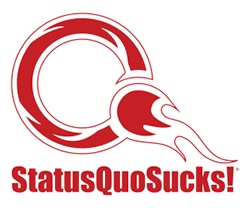Today we’re sharing insight from guest blogger JB Brown, President at Bremen Castings, Inc. We hope you enjoy JB’s wisdom and perspective.
 Status Quo Sucks! (SQS) is not just a saying. It's a culture and a way of life. It means you are committed to continuous improvement - both professionally and personally - through education, engagement, and challenging the status quo.
Status Quo Sucks! (SQS) is not just a saying. It's a culture and a way of life. It means you are committed to continuous improvement - both professionally and personally - through education, engagement, and challenging the status quo.
Every day I wake up and wonder what I, or my team, can change to rid of the waste that hinders us from being the best we can be. SQS started as a name for a continuous improvement program but it's so much more. Status quo is everywhere. It's in our homes, government, restaurants, and work. It's everyone's responsibility to find the waste and improve the process. These projects don't have to be big ideas. As a matter of fact, they should all be small. That is what will fix the bigger issues.
What’s an example of waste? My stand up desk has a dry erase desktop so I can write notes or draw pictures right on my desk but I often lose my two color markers. I then waste time looking for them. To eliminate this waste, I put Velcro on the markers and stuck them to my monitor. Now they have their place and I no longer have to look for them.
Instead of accepting the status quo and saying “it is what it is,” recognizing the things that bother us and fixing them daily will turn your life around. How can you do this? There are 8 deadly wastes that need to be challenged every day:
- Overproduction – producing ahead of demand
- Transportation – moving products that are not actually required to perform processing
- Inventory – storing parts, pieces, and documentation ahead of requirements
- Defects – the effort involved in inspecting for and fixing quality issues
- Over-processing – additional activity resulting from faulty equipment or bad design
- Motion – people or equipment, moving or walking, more than is required
- Waiting – waiting for the next step
- Loss of Employee Potential – underutilization of a person’s talent
By knowing these 8 forms of deadly waste, you can start to identify the waste around you and work towards eliminating it - one little continuous improvement at a time.
Everyone is busy. We can all come up with excuses to explain why there is no time for eliminating waste. But if you take just a couple of minutes, it will actually lead to more time being available. Also remember that continuous improvement and the elimination of waste is not just about you, but also about leaving it better for the next person.
What’s The Risk?
Being status quo is the risk!
If you are happy being frustrated, lost, and wasting time doing tasks for no reason then go ahead and take that risk…but I don't think you want to.
This content was written and shared by guest blogger, JB Brown.
 In its 4th generation, JB Brown is president of Bremen Castings, Inc. – a family owned and operated foundry and machining facility. JB is passionate about the metal casting industry and an expert in the industry. A frequent contributor to the Wall Street Journal and other industrial magazines, he has established Core Values for BCI and its team members. Known for his innovative ways, he has structured BCI to be the complete manufacturing facility – able to compete worldwide by investing in state of the art equipment and people.
In its 4th generation, JB Brown is president of Bremen Castings, Inc. – a family owned and operated foundry and machining facility. JB is passionate about the metal casting industry and an expert in the industry. A frequent contributor to the Wall Street Journal and other industrial magazines, he has established Core Values for BCI and its team members. Known for his innovative ways, he has structured BCI to be the complete manufacturing facility – able to compete worldwide by investing in state of the art equipment and people.
A phrase used often by JB when developing key strategies is “SQS – Status Quo Sucks” ®. JB is a firm believer in challenging the status quo each day for continuous improvement both professionally and personally.
Connect with JB on LinkedIn or Twitter. Connect with Bremen Castings via their website, LinkedIn, Twitter, or Facebook.



